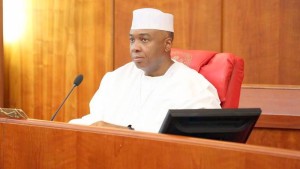In his desire to ensure that critical economic bills pending before the Senate get necessary technical input from industry players to make for efficiency and effectiveness when passed, Senate President, Bukola Saraki, on Friday inaugurated a Joint Technical Committee on the Transport Sector Reform Bills to ensure technical inputs for efficiency and effectiveness.
Saraki said the Senate the inauguration of the committee has made the passage of the various transport sector infrastructure bills a critical aspect of its legislative agenda.
In a statement Friday by his Chief Press Secretary, Sanni Onogu, listed the affected Transport reform bills to include: The Railway Bill – to reform the rail systems; the Ports and Harbour Bill – for the efficient running of the ports; and the National Transport Commission Bill – to serve as the sector’s regulatory body.
Others are the National Inland Waterways Bill – to develop the inland waterways transport system; the Federal Roads Fund Bill – to ensure efficient maintenance of the federal road network; and the Federal Roads Authority Bill – to manage the nation’s federal roads.
The Senate President said raising the committee of experts became necessary to use their technical knowledge to enrich and assist the work of the various Senate standing committees.
It is also to ensure that there is regulatory alignment across the entire regulatory arrangements in the transport sector.
The committee, with Sam Amadi as chairman, also has as members including Nnanna Ude, Philip Asante, Olusegun Toluhi, . Kingsley Amaku, Akin Ajibola, Kayode Khalidson, Tayo Aduloju, Joyce Wigwe, Rowland Ataguba, Sotonye Etomi and Sam Aiboni.
Addressing the committee members, Saraki said, “Your work therefore, is to ensure the integrity of the entire system, the efficiency and legal integrity of the various transport bills enumerated above to enable the Senate reduce areas of conflict, inefficiency, unnecessary regulatory burden and ensure the achievement of the overarching objective of reducing cost of doing business and increasing the ease of doing business for our SMEs.
“Your work today, is very critical and will help ensure that our decisions on these bills are grounded in knowledge and field experience vital for the success of the objectives of the laws as these bills will not only serve this generation effectively but many more generations to come”.
He noted that the 8th National Assembly is not unaware of the cry of Nigerians over the issue of bad roads, inefficient rails, sloppy port operations and dropping efficiency levels in the aviation industry.
“Like you, we want to see the day when we shall no longer hear that our people spend endless man-hours stuck in traffic; weeks on end clearing simple goods from the port and the attendant rise in cost of doing business due to these challenges.
“While we are, indeed, in a hurry to ensure we deliver on our promise to our people to pass all our economic reform bills, this 8th Senate is determined to also ensure that they actually meet our needs not just for today but for generations yet unborn.
“We want to ensure that this exercise is able to cut by a half, our World Bank’s ease of doing business ranking. In a nutshell, it is important to us that we get it right and your invaluable contributions will be most helpful,” Saraki said.
He noted that the Bills when passed would help the country modernize and expand its transport sector infrastructure.
He added that already there is the National Assembly Business Environment Roundtable (NASSBER) report which suggests that the bills alone can help add 87,000 new jobs annually for the next five years, with an income growth average of seven percent.
Saraki continued, “This is our aim, to see more jobs added to get our people out of the streets and occupied and opportunity to see our economy diversify and recover from recession. But this will only happen if these bills are well and carefully synchronized to deliver especially in the regulatory framework we have adopted.
“This Senate is on the same page with the Executive on this. The task we have set for ourselves has never been done before. We are however, not overawed by it.
“Rather, we have embraced it as the necessary challenge and needed sacrifice to make for us to achieve a secure Nigerian economy for tomorrow. We have set out to comprehensively reform our entire market framework to entrench efficiency, accountability, independence and market orientation across our economic base.
“This is especially so with the infrastructure market architecture with our adoption of the intermodal transport sector scheme. This is where the work of this committee is most critical”.
Responding on behalf of the other members of the Joint Technical Committee, a former Chairman of the Nigerian Electricity Regulatory Commission (NERC) and chairman of the committee, Sam Amadi, thanked the Senate President and his colleagues for the quality leadership they have been providing for the country.
He described the Joint Technical Committee as an innovative approach in lawmaking that has brought experts from the business community and the academia together to examine proposed institutional and regulatory frameworks to enable the legislators make the best laws possible for the country.
“We appreciate these innovation and we are already seeing how it is improving the quality of lawmaking. Our task is simple sir, to make sure that the bills are right. We will do our best to deliver on our assignment”.
